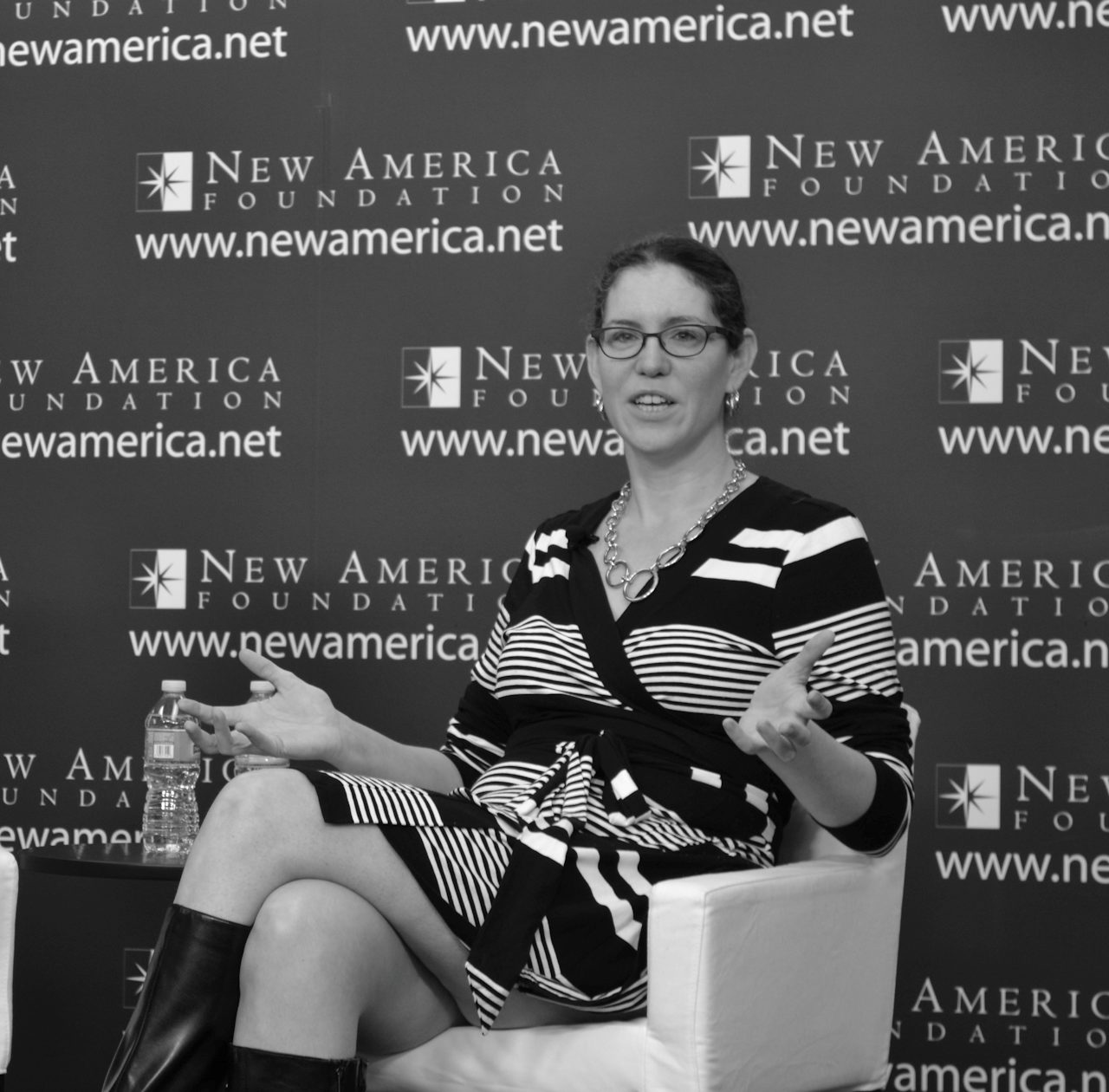Bloomberg View’s Megan McArdle is perhaps one of the worst living writers. For more than a decade, McArdle has been the go-to columnist for publications who need a right-wing perspective but aren’t quite ready to cosign the gauche mannerisms of the conservative movement. Her writing alternates between nauseating banality and Gilded-Age social darwinism. With McArdle, you never know quite what you’re going to get, but you know it will be bad. One day, she’ll write a defense of good old-fashioned pie; the next, she’ll say that Wal-Mart’s wages are too high. If she were satire, she would be part of a long tradition of works — American Psycho, The Virgin Suicides, Breaking Bad — that reveal the incredible sociopathy that festers underneath the pleasant affectations of certain suburbanites. Unfortunately, she’s real, and she writes five columns a week.
McArdle made her entrée into media in 2001, when she started the blog Asymmetrical Information under the pseudonym Jane Galt (a reference, of course, to Ayn Rand’s arch-capitalist manifesto Atlas Shrugged). Her commentary, which included her scoffing at claims that the Iraq War would end up costing trillions (it’s estimated that the total cost of the war will exceed $6 trillion) and fantasizing about anti-war protesters being clubbed with two-by-fours, impressed the dullards at The Economist enough that they hired her to write for their website in 2003. In 2007, she moved to The Atlantic, where her very first column, titled “Don’t Panic,” downplayed fears of the recession that was to commence five months later. “So while I wouldn't say you should be exactly sanguine about the mess in the markets, it's not time to panic yet. Save that for the Yankees' pitching lineup,” she wrote. In 2012, The Daily Beast hired her, and a year later, she moved to Bloomberg, where her libertarian bloviations have reached new heights of absurdity.
McArdle’s ability to keep her Ayn Rand sophistry just subtle enough not to offend the ostensibly liberal publications who employ her is her greatest — and possibly only — strength as a writer. One of her latest columns for Bloomberg, titled “We Didn't Normalize Trump. We Normalized the Left's Violence,�� is a pointless and disjointed attempt to understand and discount the anti-fascist movement known as antifa. McArdle uses the fact that UC-Berkeley recently spent $600,000 on police protection when conservative douchebag Ben Shapiro gave a speech on campus to launch into a willfully naive rant about protesters’ supposed stranglehold on America. “I really began to notice [antifa] around the time of Trump’s election,” she writes, proudly professing her ignorance of the decades-old movement she chose to write about. According to McArdle, their stated purpose of opposing fascists is fallacious, because “It’s not as if the police are unable, or unwilling, to deal with white supremacists who commit violent acts.”
McArdle’s ability to keep her Ayn Rand sophistry just subtle enough not to offend the ostensibly liberal publications who employ her is her greatest — and possibly only — strength as a writer.
Yes, take it from a white, middle-aged Ivy League grad with a masters degree (McArdle is a graduate of the University of Pennsylvania and got her MBA at the University of Chicago): the police are doing a bang-up job! So, since white supremacist violence isn’t a real problem, what really motivates these protesters? According to McArdle, they intend to “steal our constitutionally guaranteed freedoms,” such as the right to say extremely racist shit in public. McArdle conveniently neglects to acknowledge that police are often the perpetrators of racist violence, hence the existence of Black Lives Matter, or that the entire Berkeley controversy was concocted as a publicity stunt by alt-right provocateurs, or that spending $600,000 to crack down on protesters is the last thing from “normalizing” them. It doesn’t matter that she barely understands the subject, or that her argument is based on a bunch of conjecture. She doesn’t care.
McArdle’s most iconically wrongheaded effort for Bloomberg this year was a June column on the Grenfell Tower fire in London, which killed 60 people and left hundreds homeless. Titled “Beware of Blaming Government for London Tower Fire,” McArdle flippantly attempts to concern-troll one of the most cut-and-dry examples of the human cost of post-recession austerity. McArdle correctly acknowledges that Grenfell might not have claimed as many lives if regulators had required sprinkler systems in the tower, but then proceeds to brainstorm bizarre hypotheticals in which installing sprinklers might have actually killed more people. “Every dollar [the government] spends on installing sprinkler systems cannot be spent on the health service, or national defense, or pollution control. Would more lives be saved by those measures or by sprinkler systems in public housing? It’s hard to say,” she writes. It’s worth noting that this abomination of an opinion piece was published before many Grenfell victims were pulled from the smoldering rubble that was, literally, their entire lives. “It’s possible that by allowing large residential buildings to operate without sprinkler systems, the British government has prevented untold thousands of people from being driven into homelessness by higher housing costs.” I would like to deem McArdle a Sociopath of the Highest Order for writing this column, but sociopaths are typically more clever with their sadism.
McArdle’s opposition to any policy that might possibly help the poor tends to overshadow her writing itself, but make no mistake: she cannot construct an argument, even after 16 years of practice in the highest echelons of media. In another recent column, titled “Don't Pretend Your Dog Is a Service Animal,” she invents a scenario in which a fellow restaurant-goer (terrible columnists are required to write about restaurants at least once a week) tried to pass off their dog as a service animal. At first, it appears to be a typical example of upper-middle-class nosiness, akin to judging a stranger’s EBT purchases, but no, there’s a twist. “One obvious answer,” she writes, “is that we could establish a certifying body for service dogs.” Okay, probably unnecessary, but I guess it makes sense. She continues: “But it might be more effective to tweak another part of the legal code: the health regulations that currently keep non-service dogs and cats out of so many public spaces.” Of course! “If Americans weren’t completely barred from bringing their pets out with them to so many places, they might not feel so much need — or entitlement — to exploit loopholes.” To prevent people from buying fake service dog vests and bringing untrained dogs into restaurants, a problem that does not exist, we should allow everyone to bring their untrained dogs into restaurants. I can only imagine two origin stories for this mess of an article: either her dog is secretly sentient, Toy Story-style, and he hijacked her byline while she slept in order to lobby for his own interests — or, more plausibly, McArdle has brain worms.
I would like to deem McArdle a Sociopath of the Highest Order, but sociopaths are typically more clever with their sadism.
McArdle’s crushing inanity is displayed, sans evil, in her 2014 nonfiction book The Up Side of Down: Why Failing Well Is the Key to Success. Up Side is the Platonic ideal of a vapid self-help/pop-psych bestseller. In just the first chapter, McArdle mentions TED Talks, quotes an analytics CEO on the subject of neuroscience, repeatedly brings up her Ivy League education, quotes Alain de Botton, denounces “participation trophies” and opines on “the plight of poor kids in failing schools.” She even coins the term “groupidity,” which means “doing something stupid because other people around you seem to think it’s safe.” Between convoluted metaphors about “the brain,” McArdle affects a self-deprecating tone and inserts her own tales of woe. “I am a spectacular failure. I am the Mozart of misfortune, the Paganini of poor luck,” she writes in the preface. These “failures” include: doing a summer internship at Merrill Lynch, but not really liking it; not getting a good job right out of college; and having to work for her dad, who was head of a New York City trade association. How inspiring that she survived all that and lived to tell the tale!
McArdle is right to put faith in the power of failure, but not because it allows inner-city teens to regrow neurons with the power of Big Ideas, or however it goes. She looks to failure because people in her social class and with her skill level fail upwards. No matter how insipid your prose, wrong your predictions or noxious your views, a life of general affluence and a willingness to debase yourself will always get you work. But that work isn’t always prestigious. Just as McArdle’s experience bouncing between jobs in Manhattan as an Ivy League grad wasn’t “failure,” writing for Bloomberg View as a 44-year-old with degrees from Penn and the University of Chicago isn’t exactly success. She ended up somewhere between failure and success, which is evidence both for and against the existence of media meritocracy — she should be working in retail, but she also could have a New York Times column. Thank God she doesn’t.

